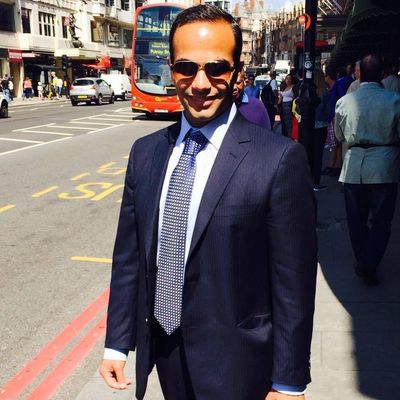
A juicy New York Times report published Saturday reveals that George Papadopoulos, the Trump foreign-policy adviser who was indicted in October, inadvertently set off the FBI investigation into Russian electoral interference that has become an existential threat to the president.
It all began, as so many memorable tales do, with a night of “heavy drinking at an upscale London bar.” It was May of 2016, and Papadopoulos was knocking back some Pimm’s cups (we can only imagine) with Australia’s top diplomat in the U.K. when he decided to divulge some very interesting information: Russia was in possession of damaging information about Hillary Clinton.
Exactly how much Mr. Papadopoulos said that night at the Kensington Wine Rooms with the Australian, Alexander Downer, is unclear. But two months later, when leaked Democratic emails began appearing online, Australian officials passed the information about Mr. Papadopoulos to their American counterparts, according to four current and former American and foreign officials with direct knowledge of the Australians’ role.
The hacking and the revelation that a member of the Trump campaign may have had inside information about it were driving factors that led the F.B.I. to open an investigation in July 2016 into Russia’s attempts to disrupt the election and whether any of President Trump’s associates conspired.
Together with more information about the Trump/Russia connection from the British and Dutch governments, plus a suspicious trip to Moscow by Trump adviser Carter Page, the FBI decided it had enough to open an investigation, which it kept quiet throughout the election — too quiet, Democrats charge. The probe eventually developed into the ongoing effort headed by special counsel Robert Mueller. Papadopoulos’s indictment, for lying to the FBI, was seen as a particularly worrying sign for the Trump administration because of his direct involvement with Russians who had offered the campaign the dirt on Clinton in the form of hacked emails.
The timing of Papadopoulos’s ill-fated remarks at the London bar are key. In an effort to discredit the Russia investigation, Republican commentators have been pushing the notion that the FBI began its inquiry on the basis of the now-infamous “Steele Dossier,” the document put together by ex–British spy Christopher Steele, which alleged that Russia interfered in the election and had possible “kompromat” on President Trump. Republicans claim that the dossier is full of misinformation, and that, since the Democratic National Committee paid the firm that employed Steele, the document — and thus Mueller’s investigation — was tainted from the start
But the Times article makes it clear that it was Papadopoulos, not Steele, who drove the investigation, at least in the beginning. This blows up an important line of attack for Republicans looking to tar Mueller — though undoubtedly they’ll find other ways to do it.
The Times article also provides more detail about the labryinthine path through which Papadopoulos attempted to set up a meeting between Trump and Vladimir Putin. And it puts to bed the notion, advanced by the Trump team, that the previously inexperienced Papadopoulos was an inconsequential figure on the campaign, or a “coffee boy,” in the words of ex-adviser Michael Caputo. Papadopoulos was actually a mainstay among the ragtag group of advisers that helped propel Trump to the Republican nomination. And he helped edit Trump’s first major foreign-policy speech, in April of 2016, in which the president expressed his wish for warmer relations with Russia.






























